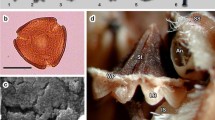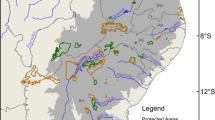Abstract
We carried out an inventory of the cactus species occurring in the Mier y Noriega region. The study was conducted in a square-shaped area of approximately 2845 km2, located in the southeastern segment of the Chihuahuan Desert region, between 23°00′ – 23°30′ lat. N and 100°00′ – 100°30′ long. W, including parts of the states of Nuevo León, Tamaulipas, and San Luis Potosí, Mexico. In order to know the cactus diversity, we developed an intensive method of botanical collecting; a total of 80 sites were sampled. With 54 species recorded, of which 28 were new area records and 14 new state records, the Mier y Noriega region is considered moderately rich in cactus species. Cactus diversity is distributed unevenly in the area, and the greatest species concentration occurs in its southwestern portion. The analysis of geographical distribution of individual species showed that the highest proportion (82%) are endemic to the Chihuahuan Desert Region, six of them having extremely narrow distributions. In addition, 19 species are considered endangered. With the aid of a complementarity analysis, we propose a strategy for the optimal conservation of the species and their habitats.
Similar content being viewed by others
References
Arias S, Gama S and Guzmán U (1997) Cactaceae A. L. Juss. Flora del Valle de Tehuacán-Cuicatlán. 14. Instituto de Biología, Universidad Nacional Autónoma de México, Mexico City
Bárcenas RT (1999) Patrones de distribución de cactáceas en el estado de Guanajuato. Tesis de Licenciatura. Facultad de Ciencias, Universidad Nacional Autónoma de México, Mexico City
Castillo O, Blanco M and Toledo C (1983) Estudio de las cactáceas de la cuenca baja del Río Balsas. Universidad Autónoma de Guerrero, Mexico, Chilpancingo
CITES (1990) Appendices l, ll and lll to the Convention. US Fish and Wildlife Service, Washington DC
Cornet A (1985) Las Cactáceas de la Reserva de la Biosfera deMapimí. Instituto de Ecología A.C., Mexico City
García E (1988) Modificaciones al Sistema de Clasificación Climática de Köppen para adaptarlo a las condiciones de la RepÚblica Mexicana. Offset Larios, Mexico City
Gaston KJ (1994) Rarity. Chapman & Hall, London
Gómez-Hinostrosa C (1998) Diversidad, distribución y abundancia de cactáceas en la región de Mier y Noriega, México. Tesis de Licenciatura. Facultad de Ciencias, Universidad Nacional Autónoma de México, Mexico City
Henrickson J and Straw RM (1976) A Gazetteer of the Chihuahuan Desert Region. A Supplement to the Chihuahuan Desert Flora. California State University, Los Angeles
Hernández HM, Alvarado V and Ibarra R (1993) Base de datos de colecciones de cactáceas del Norte y Centroamérica. Anales Inst. Biol. Univ. Nac. México 64: 87–94
Hernández HM and Bárcenas RT (1995) Endangered cacti in the Chihuahuan Desert: l. Distribution patterns. Conservation Biol. 9(5): 1176–1188
Hernández HM and Bárcenas RT (1996) Endangered cacti in the Chihuahuan Desert: II. Biogeography and conservation. Conservation Biol. 10(4): 1200–1209
Hernández HM and Godínez H (1994) Contribución al conocimiento de las cactáceas mexicanas amenazadas. Acta Bot. Mex. 26: 33–52
Humphries C, Vane-Wright D and Williams P (1991) Biodiversity reserves: setting new priorities for the conservation of wildlife. Parks 2(2): 34–38
Hunt D (1992) CITES Cactaceae Checklist. Royal Botanic Gardens Kew, Surrey
INEGI (1988) Atlas Nacional del Medio Físico. Instituto Nacional de Estadística, Geografía e Informática, Mexico, Aguascalientes
León JL, Coria R and Cansino J (1995) Reserva de la Biosfera El Vizcaíno, Baja California Sur. Listados Florísticos de México. Instituto de Biología, Universidad Nacional Autónoma de México, Mexico City
SEDESOL (1994) NormaOficialMexicana NOM–059–ECOL–1994, que determina las especies de flora y fauna silvestre, terrestres y acuáticas en peligro de extinción, amenazadas, raras y las sujetas a protección especial y que establece especificaciones para su protección. Diario Oficial de la Federación 438: 2–60
Pinkava DJ (1984) Vegetation and flora of the Bolsón of Cuatro Ciénegas region, Coahuila, Mexico: summary, endemism and corrected catalogue. J. Arizona-Nevada Acad. Sci. 19: 23–47
Pressey R, Humphries C, Margules C, Van-Wright R and Williams P (1993) Beyond opportunism: key principles for systematic reserve selection. Trends in Ecology and Evolution 8: 124–128
Rabinowitz D (1981) Seven forms of rarity. In: Synge H (ed) The Biological Aspects of Rare Plant Conservation, pp 205–217. Wiley, New York
Ruiz de Esparza R (1988) Lista de las especies vasculares. In: Montaña C (ed) Estudio Integrado de los Recursos, Vegetación, Suelo y Agua en la Reserva de la Biosfera de Mapimí, pp 225–239. Instituto de Ecología A.C, Mexico City
Rzedowski J (1956) Notas sobre la vegetación del estado de San Luis Potosí. III. Vegetación de la región de Guadalcázar. Anales Inst. Biol. Univ. Nac. México 27: 169–228
Rzedowski J (1991) Diversidad y orígenes de la flora fanerogámica de México. Acta Bot. Mex. 14: 3–21
Villarreal JA (1994) Flora vascular de la Sierra de la Paila, Coahuila, México. Sida 16(1): 109–138
Walker KS and Gillett HJ (eds) (1998) 1997 IUCN Red List of Threatened Plants. Gland and Cambridge: Compiled by the World Conservation Monitoring Center. IUCN–The World Union
Williams P, Humphries C and Vane-Wright R (1991) Measuring biodiversity: taxonomic relatedness for conservation priorities. Austral. Syst. Bot. 4: 665–679
Author information
Authors and Affiliations
Rights and permissions
About this article
Cite this article
Gómez-Hinostrosa, C., Hernández, H.M. Diversity, geographical distribution, and conservation of Cactaceae in the Mier y Noriega region, Mexico. Biodiversity and Conservation 9, 403–418 (2000). https://doi.org/10.1023/A:1008935710910
Issue Date:
DOI: https://doi.org/10.1023/A:1008935710910




